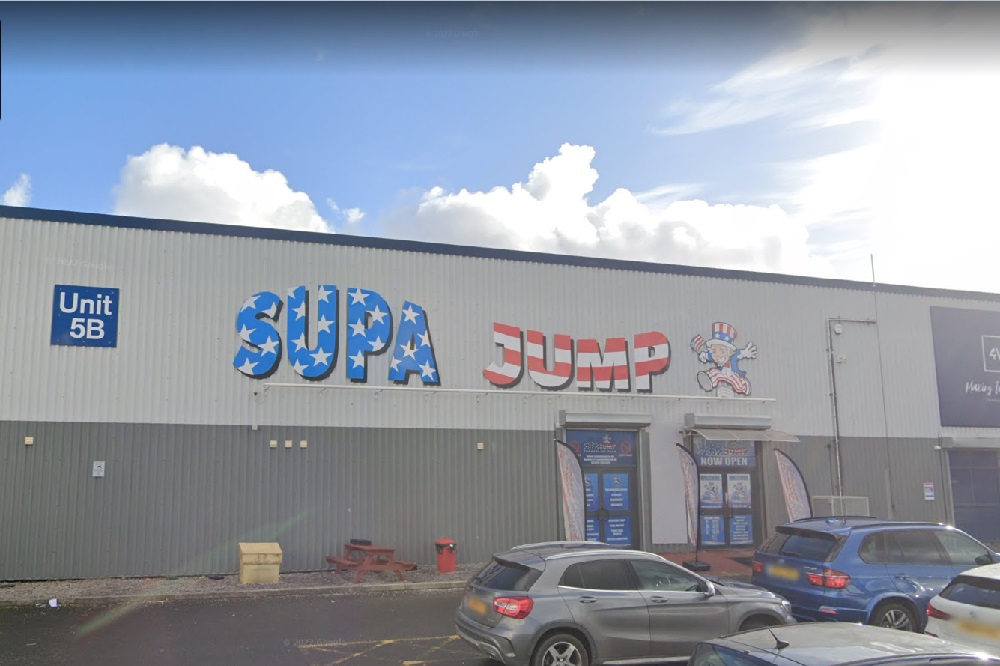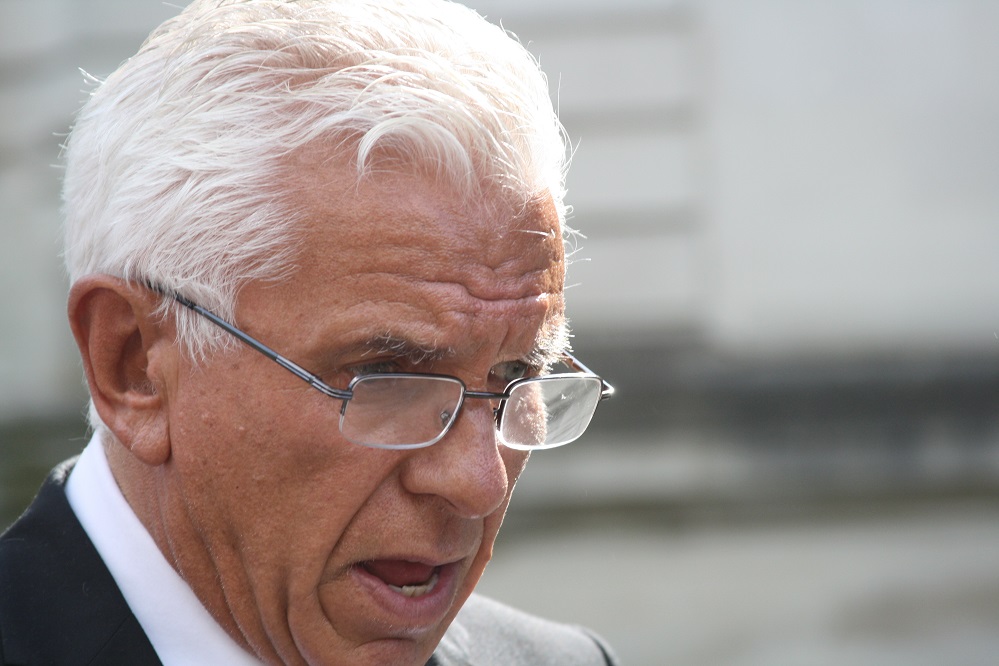Owner of Cardiff trampoline park sentenced after youngsters suffer serious injuries

Ted Peskett, local democracy reporter
UPDATED with additional picture of Philip Booth and a quote from Cardiff Council
A child suffered a spinal injury while other youngsters suffered broken legs while jumping on trampolines and into foam pits at indoor play place that repeatedly ignored safety warnings.
A judge was told that owner Philip Henry Booth put “profit before safety” when running Supajump in Trident Trade Park, Cardiff.
The city’s crown court heard that prior to opening up, he was warned that the trampoline park was not safe – but he still went ahead regardless.
Prosecutors said that the venue between late 2017 and mid 2019 was “chaos” and “like a zoo” – with no proper safety briefings for parents and their children.
And a judge was told that over the course of that year, half a dozen children – aged between 3 and 11 – ended up getting badly hurt at the venue. Injuries they suffered included broken legs and in one case a spinal injury.
An investigation later found as well as improper padding and poor training for staff, items found at the bottom of a foam pit included a pair of scissors, a lighter and a rolled up cigarette.
His defence, said the former sweet shop owner had been “overwhelmed” by running a trampoline park and insisted he had not neglected people’s safety in danger at the expense of making money.
Culpable
However, Judge Matthew Seymour Porter–Bryant said Booth had shown a lax attitude and was “highly culpable”.
He said: “You were warned on numerous occasions……you were made aware of concerns that existed by the regulator of health and safety.
“You were told what you were doing was wrong……(yet) the same time of accident kept happening.”
During a sentencing hearing at Cardiff Crown Court on Monday, prosecutor Carl Harrison said the defendant had been charged with four counts of failing to report an accident and two counts of failing to ensure people were not exposed to health and safety risks from using play equipment at Supajump The offences dated from October 2017 to August 2019.
The court was told that ahead of the park opening in April 2017, a safety visit by regulators was carried out the previous month.
“Numerous failings were noted during this visit. Some of the trampoline arena did not appear to have padding….or was ill fitting or had inadequate thickness,” Mr Harrison said.
Because of a “myriad of failings”, Booth was asked to provide a risk assessment, the court heard – with the Crown arguing Supajump was “manifestly” not in a position to open safely.
Mr Harrison added: “He had direct knowledge of those issues and chose to ignore them.”
The court heard that after having opened without an independent safety inspection taking place, a child was left bleeding from the mouth and “crying and shaking” after getting trapped down the side of the air bag at the trampoline park.
The court also heard how the child had difficulty breathing before being rescued and details of the incident were not taken down. When the child’s parent spoke to park owner Booth, the court heard that he told them: “It’s only a graze not to worry”.

The second incident at the trampoline park involved a young child who broke her leg after accidentally being struck by another adult.
Prosecutor Mr Harrison told the court that the family of the child had not been informed of a safety briefing before the incident.
The child was described as being “white as a ghost” after the incident and was taken to the University Hospital Wales, Cardiff, where they were diagnosed with a fracture just below the knee.
The court was told that a third incident saw a child fracture their tibia and fibula after jumping into a foam pit.
Again, Mr Harrison said no safety briefing or advice was given ahead of this incident. The child was taken to hospital “screaming in pain” according to Mr Harrison.
On inspection of the foam pit, a number of objects including cigarettes, lighters, springs and a sanitary towel were found underneath the foam cubes.
Mr Harrison added that within 18 months of the accident having taken place, children were back playing in the foam pit.
Broken femur
In April 2019 a child suffered a broken femur in another incident involving the foam pit and had to undergo surgery.
Mr Harrison said that at the time of the incident, no one was watching the foam pit and there had been no mention of a safety video to the family beforehand. The child eventually had to have a second operation and suffered scarring.
A fifth incident saw a young child break their fibula and tibula after ‘double jumping’ on one of the trampolines and landing awkwardly.
According to Mr Harrison, the child, who was left “hysterical” after the injury, should have been in the under fives area of the trampoline park.
In the sixth incident which took place at the site, a nine year old child suffered a spinal injury after being thrown into the foam pit by their parent.
The area was supervised by a member of staff at the time, according to Mr Harrison.
However, he added that the parent had been allowed to throw their child four times into the foam pit without being told that they shouldn’t. It later transpired that the child had a misdiagnosed injury in the form of a compression fracture.
The court also heard that, during the indictment period, the park was understaffed and that workers were not properly trained. One staff member said that they were “not told much” and “figured most of it out by reading the signs”.
Mr Harrison said: “Basically they allowed a 17-year-old to teach a 16-year-old to teach the next cohort of staff.”
And he also told the court: “Children would suffer cuts and bruises and they’d be given wet paper towels”.
Booth’s barrister John Ryan said the business was set up for a cost of £500,000 and had been established thanks to a mix of a loan and money from his elderly father. He said that his client had pleaded guilty at the earliest opportunity and was incredibly remorseful.
Naive
He said: “He is a man that’s put his heart and soul in the business…..He was naive. He came from a background of running a sweet shop and may have been overwhelmed by the complexities of running a business (such as this)”.
He also gave a number of character references to the court – including ones from disability groups saying that Booth had been incredibly helpful towards them as well as a Muslim group, who said the defendant had shown a great deal of professionalism and sensitivities towards their specific visit.
He also said that a number of lessons had been learned, proper safety measures were in place and that the business now had 20 members of staff – 70 per cent of which were trained in first aid.
Judge Porter–Bryant said the offences were clearly serious and showed a high degree of culpability and that “the same issues kept running” throughout the period of offences.
He said: “You intentionally breached of flagrantly disregarded the law.”
But after listening to both the prosecution and defence’s submissions, he said that there were elements of each others’ argument that “balanced themselves out”.
He decided against sending the defendant straight to jail. Among the key factors was that if Booth was sent to prison immediately, Supajump would likely close – thus reducing the chances of victims claiming any compensation in the future, because the defendant would likely no longer have the means to pay.
The Judge also said: “In the intervening period, you have done one of the best things – you have run a business that has seemingly turned a corner in terms of its accidents and incidents.”
The court also heard that safety measures had since been put in place and that the probation service regarded Booth as having a “low risk of re-offending”.
Booth was handed a 10 month prison sentence suspended for 18 months. He was also fined £10,000 and ordered to pay £10,000 in court costs. He will also have to carry out 200 hours of unpaid work.
Compensation
The judge decided against making the defendant pay compensation to those injured – saying that more of a matter for the civil courts. He also said there was a risk that could “vastly undercompensate” victims, because he would not have detailed medical reports that would be made available in a civil case.
The cabinet member responsible for Shared Regulatory Services at Cardiff Council, Cllr Dan De’Ath, said: “This is a case where basic health and safety processes were not followed by a business and despite repeated contact by our officers, the problems persisted and remained a concern.
“Put simply, children were put at risk and injured. The incidents that occurred show a total disregard by both Mr Booth and his business for the legislation that is in place.
“As the business is still operating, council officers will continue to monitor any further complaints or concerns that we receive and if necessary, will take further legal action against this business.
“The sentence should send a clear message that the court takes health & safety offences very seriously.”
Support our Nation today
For the price of a cup of coffee a month you can help us create an independent, not-for-profit, national news service for the people of Wales, by the people of Wales.





Why was he allowed to continue or given a licence in the first place…culpability must lie to some extent with the authorities and that is probably why he is not going to prison…
Of course the authorities are culpable. They should have shut him down much earlier but it seems all business is sacrosanct until something catastrophic happens or the mountain of incidents becomes too big to ignore. Local authority, Health & Safety, even the NHS when confronted with injured kids all of them could have piped up sooner and louder.